“What is the price women need to pay to be heard?” This was the question I asked myself after watching the movie Suffragette recently. The film offers a glimpse into the harsh realities early 20th century women and girls had to endure simply for being female, and the countless sacrifices they made to secure the right to vote specifically on the basis of their sex. In a desperate bid for those in power to take note, the climactic scene shows Emily Davison paying the ultimate price as she literally puts her life on the line.
Fast forward to the 2nd September 2021 and you could be forgiven for thinking a dystopian sequel was being filmed outside the Scottish Parliament, one with a sinister plot twist that sees women not only fighting to protect their hard-won rights, but the very fact that women are adult human females. The crowd outside Holyrood, however, weren’t extras, the speakers on the stage not actors, and the cameras not film crew – this was a real-life protest against Nicola Sturgeon’s plans to erase any legal distinction between an actual woman and a man who, having “lived as a woman” for six months, officially ‘declares’ himself to be one. Known as ‘Self ID’, this bureaucratic betrayal of women follows years of public authorities stealthily rewriting the script of what it means to be male and female and putting women’s interests last with so-called ‘inclusive’ policies.
The call to protest came from For Women Scotland and was answered by hundreds of women travelling from as far afield as the islands and the Highlands. Some were decked out in Suffragette period dress, some as witches, many wearing T-shirts saying “Women Won’t Wheesht” (“Women Won’t Be Quiet”) and brandishing placards saying “No to Self ID”. They came from all walks of life, united through a bond that only being female can forge, driven by a desire to say they’d had enough. A number of men had also come along to offer their support, as well as a number of Conservative MSPs.
I walked back and asked someone to tie suffragette ribbons in my hair; I wore them with a sense of pride and purpose that felt more heightened than when I’d worn them before.
As I walked up and took in the 400-500 strong crowd and the sea of purple, white and green colours of the Suffragette movement, I felt heartened at the turn out but also anger and disbelief at the situation. In the distance I saw a number of rainbow flags and trans flags, signalling a group of counter protestors. I decided to check out their signs (“Trans safety is more important than cis comfort”, “Feminism is for everyone”, “Self ID now”), and as I got closer overheard one say to another “Imagine turning up just to say “Hey look at me, I’m a bigot”, unaware she was doing exactly that. I’m repeatedly told these people are my ‘community’, but I didn’t relate to their signs or how they smeared the women protesting, much like the suffragettes were smeared and ostracised over a 100 years ago. I walked back and asked someone to tie suffragette ribbons in my hair; I wore them with a sense of pride and purpose that felt more heightened than when I’d worn them before.
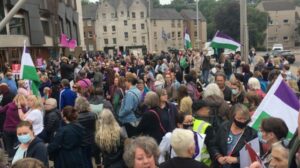
Speeches were scheduled to start at 11am and were promptly kicked off by Marion Calder, one of the founders of For Women Scotland. She pointed out how no one had yet made a convincing argument that women somehow don’t need safe spaces in hospitals and prisons, that teenage girls don’t need privacy in changing rooms, or that health and equality outcomes based on sex should be ignored. Her message to the First Minister was clear: “You don’t get to play games with our lives or the lives of our mothers, sisters and daughters without reason or explanation.”
The applause she received throughout her address, the booing in response to mentions of Nicola’s name, and the full-throttled rounds of chanting “Women Won’t Wheesht” revealed the pent up anger and disappointment in the crowd.
Seven more speeches followed, highlighting how the rights of women and girls have already been surrendered in prisons, hospitals, schools and other areas in what appears to have been moves anticipating the legislation of Self ID. For anyone wondering “How did we get here?” Kate Coleman from Keep Prisons Single Sex offered a perfidious case study of policy subversion: in 2014 the Scottish prison service introduced a Self ID-style policy written by the Scottish Trans Alliance (STA) without consulting women or organisations representing their interests. This was no oversight – STA, by their own admission, had specifically strategised to set a precedent in prisons so that other public services could follow suit. In other words, if they could foreground the interests of men claiming a trans identity over female prisoners (some of the most exceptionally vulnerable and traumatised women in society), it could be done elsewhere. “I think this is wrong”, said Kate, “If we can’t get it right for women in prison, who can we get it right for?”
The person who needs to hear these echoes the most is, of course, the First Minister herself; self-identifying as a feminist doesn’t count for much when you’re seen as a destroyer of women’s rights.
Rhona Hotchkiss from LGB Alliance pointed to what the future could hold should Self ID come to pass: “The next step will be… to have sex removed completely [as a protected characteristic] from the Equality Act or to have its meaning changed to include anyone who self IDs as anything in any and all circumstances without exception.” Shereen Benjamin from the University of Edinburgh warned how a culture of fear in academia was leading to self-censorship, and how this could spell the end of research, teaching and public engagement on women’s sex-based rights; meaning that robust new evidence informing policy to protect women simply wouldn’t exist (a case in point being the lack of studies into the impact of Self ID on women and girls).
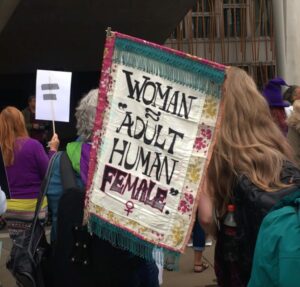
Lisa MacKenzie from independent policy analysts Murray BlackBurn MacKenzie urged the crowd to make their voices heard by calling, writing, emailing and meeting with elected officials: “These rights were hard won and the only choice is to continue to assert and demand them.” Journalist Susan Dalgety pointed out how doing so would be a continuation of the battles fought by so many suffragettes, feminists, and female trade unionists and MPs throughout the ages: “Our First Minister was lifted up by all those women”, she said, “Listen carefully and you can hear [their] echoes.” The person who needs to hear these echoes the most is, of course, the First Minister herself; self-identifying as a feminist doesn’t count for much when you’re seen as a destroyer of women’s rights.
The protest was an hour-long wake up call for Nicola and her government, a show of defiance and determination. “Nicola Sturgeon and Patriarch Harvey [sic], you better build more women’s prisons because seditious woman have had enough! We are many, we are all ages, and we are not going to wheesht!” said Alba Party councillor Caroline McCallister to rapturous applause.
Some of the counter protesters would shout out during the speeches, only to be met with a chorus of “Women Won’t Wheesht!” One counter protester, a woman herself, tried to make her way through the crowd to the stage as Shereen Benjamin was speaking. She held both a ‘progress pride’ flag aloft and a megaphone playing a pre-recorded message saying, “Keep hate off our streets”. A number of police officers surrounded her, but didn’t remove her, and she refused to leave, intent on disrupting proceedings. “They’re just illustrating what I’m saying”, said Shereen, “They’re trying to stop you from speaking.” The counter-protestor later congratulated herself on her efforts, tweeting “The bigots couldn’t hear themselves think.”
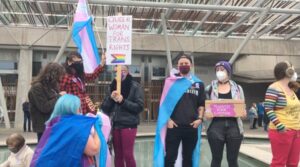
There was tension in the air after the crowd began to disperse, too. Less than 15 minutes after Susan Dalgety had pointed out how 1500 Scots women had been burnt at the stake for supposed witchcraft, a heavily built trans-identified man rushed towards a group of women with his rollator screeching “Witch! Witch! Witch!” before being pushed back by a police officer. He continued his screeching from a distance. I also noticed an altercation between another heavyset counter-protester and a much smaller woman, so intervened. He accused her of touching his sign and said he’d happily head butt anyone who tried to do so. “There’s no place for violence here”, I said, but he simply repeated his claim.
Politicians, of course, know full well that there’s much more to being a woman than a pronoun party or having a certain ‘feeling’ – the protest served as a wake up call for them to step up to the plate and stop pretending that biological sex doesn’t matter anymore.
I then joined a group of around 30 protesters, making our way round to the side of the parliament building. A male counter-protester with a trans flag on a meters high pole walked alongside us as if to say that we couldn’t have a space or a moment to ourselves. Ironically, his flag was too high to follow us to a spot with a concrete overhang, and he bowed out. We then sang songs and chanted some more – it was good natured and fun, and provided much needed relief from an emotionally charged event. We were watched from behind glass by a number of parliamentary staff a few meters higher up. One of them later tweeted how we’d been ‘aggressive’ and ‘red in the face’. Later in the pub, as many of us chatted and laughed and debated for hours, one of the staff (a big burly man) ripped up some of our signs saying there was no place for them there. A number of women got angry, but Marion Millar took him aside for a chat and defused the situation.
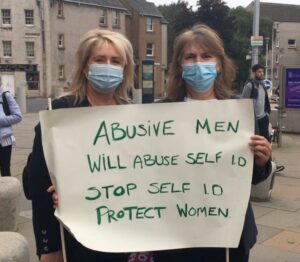
Overall, the morning was a stark reminder of the precarious situation for women’s rights in Scotland, and the anti-sentiment that exists for those who have the temerity to say that sex matters in life and in law. Politicians, of course, know full well that there’s much more to being a woman than a pronoun party or having a certain ‘feeling’ – the protest served as a wake up call for them to step up to the plate and stop pretending that biological sex doesn’t matter anymore. Judging by the crowd on Thursday, it’s an alarm that doesn’t have a snooze button and will only get louder as more women add their voices. I invite all men to add their voices too – if ever a sequel will be filmed for the Suffragette movie, let it be one that tells the story of how women in Scotland fought back against gender extremism, and won. As Susan Dalgety said: “It will be a long, hard campaign. The numbers are against us, but the distant echoes of our sisters are with us as we enter this fight. Sisters – we will win because women won’t wheesht!” And that movie will be dedicated, in part, to those women who let their voices be heard outside Holyrood last Thursday.
You can watch the speeches here:
https://www.youtube.com/watch?v=Q22wy5pm5Sw
Find out more about For Women Scotland here:
You can visit MrMenno’s YouTube channel at https://www.youtube.com/channel/UCV3876CGo9uVUvoZuUZsMgg
MrMenno is on Patreon at https://www.patreon.com/BadGaySuperGay



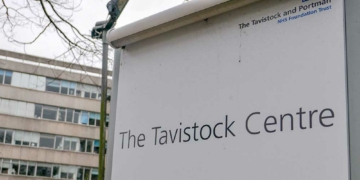
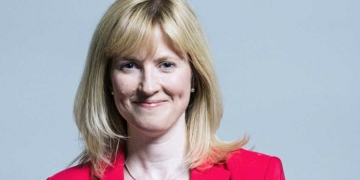
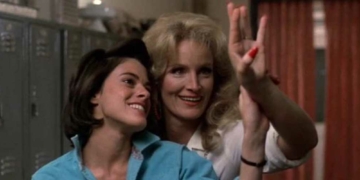












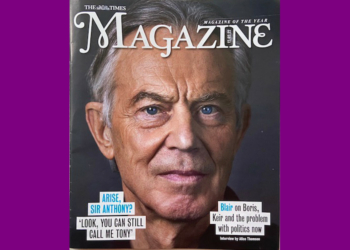




Comments
No comments yet, be the first to leave a comment.